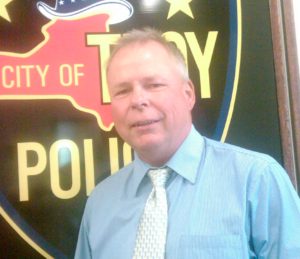 No one said this job was going to be easy. But if you asked me five years into my career, I’d tell you it was the best thing allowing me to live a full life, and protect and serve with strength and honor. I quickly learned that resilience was key – to expose my heart and soul to horrific, life changing events, but have the shock waves of trauma bounce right off. I was a warrior. I could handle it all.
No one said this job was going to be easy. But if you asked me five years into my career, I’d tell you it was the best thing allowing me to live a full life, and protect and serve with strength and honor. I quickly learned that resilience was key – to expose my heart and soul to horrific, life changing events, but have the shock waves of trauma bounce right off. I was a warrior. I could handle it all.
Then everything changed. I was faced with a suicide-by-cop attempt, planned to perfection. Do I engage my weapon to terminate the threat of a man charging me with a butcher knife? I can’t let my partner get hurt! Alternating thoughts of “shoot, don’t shoot” rush through my head.
My partner grabs the knife and saves the day, all while sustaining a life-threatening bleed. I’m okay, the suspect is unhurt, and my partner is being rushed to the hospital. My decision was made in a split second, but the implications of that decision will last forever.
I now dreaded getting dressed in the morning to go to the job I loved. I started making excuses to justify drinking all day. I stopped going to the gym. I began experiencing violent night terrors – the blood, the chaos, the decision: don’t shoot. Crying was no longer a by-product of sad movies; it was a reaction to life. I stayed in bed all day long, not wanting to face the harsh reality of my changed life.
“You are no longer a warrior,” I thought.
An Employee Assistance Program was next. Although not trusted by many of my associates, I put my trust in the system. The system embraced me, supported me and ultimately saved me. The counseling, therapy and medication took time, but I felt I was on my way back to being a warrior. Or was I?
Being of the mindset that I would always be working the streets, wearing the uniform and living in the dark shadow cast by urban patrol, I couldn’t help but think: what about the victims? What about the stigma that I feel; the same stigma keeping my fellow officers silent in their struggles? What about all the warriors whose ballistic vests shield their body from physical trauma, but not from emotional destruction?
Those were the questions that turned my life around. Advocacy, support and compassion became as important to my cases as Miranda warnings. I ended up leaving detective work to head human resources; I wanted to take the lead on breaking the stigma. When I turned the corner toward retirement, I felt I was leaving the job with my head held high, awards pinned to my breast and a service record to be proud of. The one thing I took with me that I wish could have been left in my locker, though, was my secret.
Then I stumbled upon Mental Health First Aid, and eventually became an Instructor for Mental Health First Aid for Public Safety. It was through this education that I realized my secret was safe, and yet it didn’t need to be any longer. For the first time in 26 years, after teaching my third Mental Health First Aid for Public Safety course, I shared my story. I cried, I shook and I apologized, over and over again. And I immediately saw the value in sharing. The 22 cops in the room rallied by my side; they stood by me, they cried with me and they shielded me from shame, stigma and misperceived weakness. Never before did I see my back-up respond so well to a 10-13: officer needs assistance.
Since that day, I weave my experience with depression and post-traumatic stress disorder into my teaching whenever appropriate. No longer do I carry the shame. I now know that I have a tool which I can use to save lives – and it is found in Mental Health First Aid. I will always carry with me a heavy dose of ALGEE. And one thing I will live with forever in my heart and soul is the understanding that someday, I will be ready to act as a warrior. Until then, I will be a guardian.
Ret. Capt. John Cooney served as the Public Information Officer of the Troy Police Department for 10 years. He currently speaks and instructs on victim-centered issues, mental health awareness and child abuse/sexual assault investigation through his certification as a Forensic Interviewer and Mental Health First Aid for Public Safety Instructor.